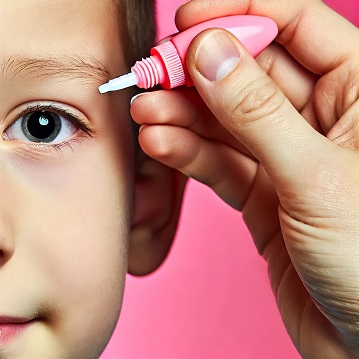Nikhil Prasad Fact checked by:Thailand Medical News Team Jun 25, 2024 9 months, 3 days, 3 hours, 24 minutes ago
Ophthalmology Updates: Myopia, or nearsightedness, is a common vision problem that is becoming more prevalent worldwide. It's predicted that by 2050, half of the world's population will be myopic, with 10% experiencing high myopia, which can lead to severe eye complications. One of the most discussed treatments for controlling myopia progression is the use of atropine eye drops. This
Ophthalmology Updates report examines the effects of 0.01% atropine eye drops in slowing down myopia progression in children over a year.
 Low-Dose Atropine Eye Drops To Slow Myopia Progression In Children
Study Overview
Low-Dose Atropine Eye Drops To Slow Myopia Progression In Children
Study Overview
A team of researchers conducted a study at the Lithuanian University of Health Sciences to assess the effectiveness of 0.01% atropine eye drops in managing myopia in Caucasian children aged 6 to 12 years. The study compared two groups: one treated with 0.01% atropine eye drops and a control group that did not receive the treatment. The primary focus was on changes in spherical equivalent (SE) and axial length (AL) of the eyes over one year.
Participants and Methods
The study involved 121 children, divided into two groups. The atropine group included 55 children who used the eye drops nightly, while the control group consisted of 66 children who did not receive the treatment. The children were between 6 to 12 years old, with varying degrees of myopia. The researchers measured the children's eye conditions at the beginning of the study and after one year, focusing on changes in SE and AL.
Key Findings
The results showed no significant difference in myopia progression between the atropine group and the control group over the one-year period. The change in SE was -0.50 D in both groups, and the change in AL was also similar. However, a deeper look revealed that children in the atropine group had higher myopia progression before the study started, which decreased significantly after one year of treatment.
Detailed Results
Before the study, the average annual progression of myopia in the atropine group was -1.01 D, which reduced to -0.50 D during the study. In contrast, the control group showed consistent myopia progression of about -0.50 D both before and during the study. This indicates that 0.01% atropine eye drops may help slow down myopia progression in children who are experiencing rapid myopia development.
Safety and Side Effects
While the low-dose atropine eye drops were generally well-tolerated, some children experienced mild side effects. These included blurred near vision, ocular discomfort, photophobia (sensitivity to light), dry eyes, and anisocoria (unequal pupil sizes). Six children discontinued the treatment due to these adverse effects.
Discussion and Implications
The study suggests that 0.01% atropine eye drops can be effective in slowing down the progression of myopia in child
ren, particularly those with rapid myopia development. However, the treatment did not show a significant difference in eye growth (AL) compared to the control group over the one-year period.
Comparison with Other Studies
Other studies have also explored the effectiveness of low-dose atropine for myopia control. For instance, a Spanish study reported a significant reduction in myopia progression with 0.01% atropine eye drops. Similarly, research in Ireland and Australia showed promising results, although some variations exist depending on ethnicity and other factors.
Strengths and Limitations
This study's strength lies in its focus on Caucasian children, providing valuable data for a population group less studied in this context. However, the study had limitations, including the lack of pre-study data for all participants and the self-selection of treatment by parents, which could introduce bias. Additionally, the one-year duration may be insufficient to observe long-term effects.
Conclusion
In conclusion, the use of 0.01% atropine eye drops shows potential in reducing myopia progression in children, especially those with rapid myopia development. However, further research is needed to explore the long-term effects, genetic factors, and the impact of higher doses of atropine. Parents considering this treatment should be aware of the potential mild side effects and discuss them with their child's eye care professional.
Future Directions
Future studies should investigate the long-term efficacy of low-dose atropine, the rebound effects after discontinuation, and the role of genetic factors in myopia progression. Additionally, exploring higher concentrations of atropine and their safety profiles could provide more comprehensive treatment options for myopia control in children.
The study findings were published in the peer reviewed journal: Medicina.
https://www.mdpi.com/1648-9144/60/7/1022
For the latest
Ophthalmology Updates, keep on logging to Thailand Medical News.
Read Also:
https://www.thailandmedical.news/news/misight,-new-contact-lens-that-slows--myopia-progression-in-children-approved-by-us-fda
https://www.thailandmedical.news/news/new-economical-and-rapid-test-for-myopia-
